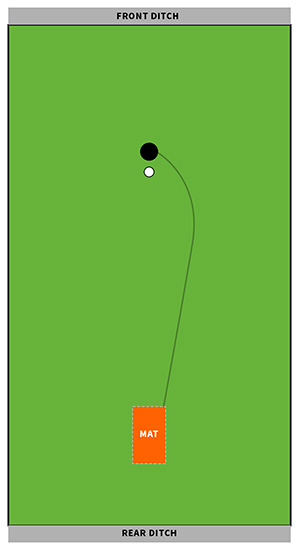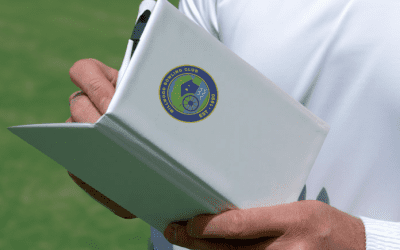Delivery of a bowl to the jack area.

From the time you pick a bowl up from the ground until the time you deliver that bowl it takes on average around 10 seconds.
Now, in your head count to 10.
That actually feels like a long time when you count it out.
Say for example that you play 21 ends in a team of 4, with 2 bowls each. You are only active for 7 minutes in the process of delivering your bowls in the whole game.
Capsule Checklist.
When being coached in Wales we call this process the ‘Capsule Checklist’. Basically, from the time you pick up the bowl to the time you deliver the bowl you should be in an imaginary ‘capsule’, focusing on the ‘task at hand’. You should have no distractions, no chatter or things that affect you in the process.
Players who are not ‘in possession of the mat’ should be at least a metre behind you, and not to your side. In possession of the mat is basically when your team are the team ‘in play’ and the opponent’s balls have come to rest, and you (or one of your teammates are either in their delivery routine, in the process of delivery or your bowl is travelling up the green but not come to rest).
The same goes for you, when your bowl comes to rest you are not in possession of the mat and should be at least 1 metre behind the head (if at the head end) or 1 metre behind the mat if at the mat end).
If you have a distraction, just reset and step back from the mat, and do the process again. It is only an additional 10 seconds.
Capsule Checklist: Pre-Shot Routine (switch the light on)
Line:
Check grip – small ring on the inside, support the bowl on the middle three fingers & lightly support with the thumb and little finger with the tread in line with your arm to your shoulder – hold bowl out at the side of the body.
Distance:
Site the jack area (back half of a foot diameter circle) – weigh the bowl then focus your attention along the delivery line, then to the aiming point.
Capsule Checklist: Delivery
Line:
Approach the mat from behind it (keep weighing the bowl) – stand square to the delivery line (delivery is almost straight up to the shoulder) – select and concentrate on your aiming point so that the bowls will run thru’ the shoulder (outside of pivot (back) foot towards aiming point, look where you bowl and bowl where you look).
Distance:
Let it happen – relaxed pendulum swing – don’t project the bowl – smooth delivery (rhythm) – lean into the delivery line – stretch your fingers – don’t run off the mat – all movement to be towards the delivery line.
LOW – SLOW – SMOOTH & HEAD STILL, stay down until bowl is well on its course.
In New Zealand they follow the coaching methods that we use in Wales. This video show what has been mentioned so far on this page.
Time Capsule Elements:
Relax :
Mind and body CENTERING – Relax whole body – Compress and relax hand muscles &/or relax through your fingertips &/or hum to yourself.
Communication:
to yourself – Bowling into the JACK AREA (behind and hand side of jack is best). Be clear what shot to play so that you can adjust your delivery relative to the draw to the jack area.
Knowledge:
Technical – Must have the knowledge to know but don’t think on delivery, you let it happen and not make it happen. Tactical – Play positive, which is to get the best result in any set of circumstances (negative play is to get the worst result).
Mental Rehearsal:
Must be clear in a player’s mind what makes up his/her delivery.
Focus of Attention:
Grip/stance/body height/step (Body Height Stature, use what suits the individual). What makes a good player? To be good you need NATURAL ABILITY PLUS.
Visualisation:
Because bowls is played from a stationary stance a good player can visualise the arc of the bowl, weight and contact. i.e. see the result before you do it.
Imagery:
Control of mental state; perhaps use CUE WORDS e.g. ‘Low and Slow’, ‘Smooth’, ‘Rhythm’, ‘Balance’, ‘Groove’.
Self Clinic:
If a bad bowl is delivered you must have done something wrong so self-analyse & concentrate on your next delivery.
Common Faults:










